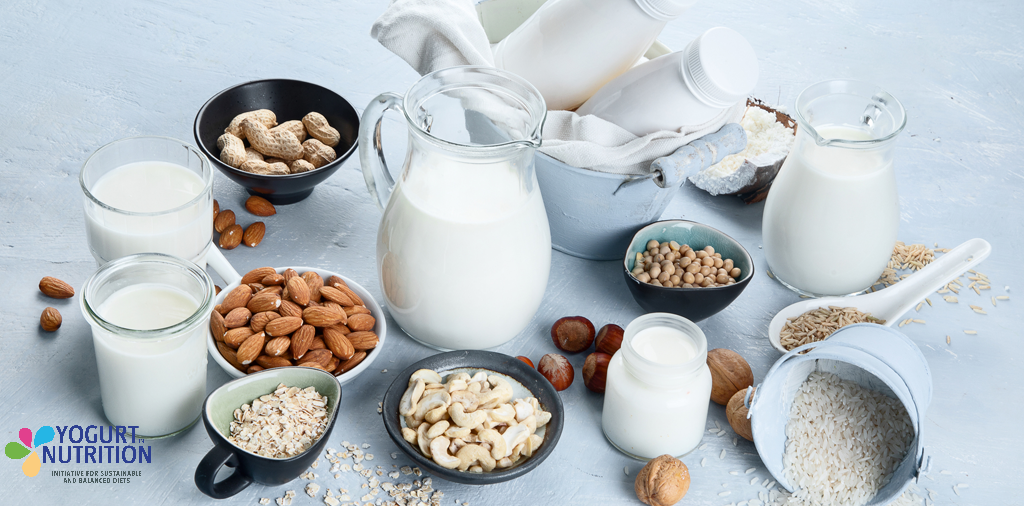You don’t have to give up all your favourite foods to make your diet more healthy and sustainable, latest research suggests. While most of us in Western countries need to eat less meat and more plant-based foods, the good news is that we can continue to enjoy our dairy foods in a nutritious diet with a reduced impact on the environment.
That’s the finding from a diet-modelling study of a French adults subgroup (1). It found that both dairy and fortified plant-based dairy-like (PBDL) products can facilitate our shift to a more sustainable, healthy diet.
So by retaining your usual dairy foods in your diet and perhaps also including PBDL products in your diet, you can find it easier to meet your own nutritional needs, cut down on the amount of meat you eat and increase the amounts of wholegrains, fruit and vegetables, and legumes, according to this modelling study.
What are plant-based dairy-like (PBDL) products?
Splash them on your cereals, add them to your coffee, or eat them as a creamy dessert; PBDL products are designed to look and ‘feel’ like milk or yogurt, and they can be used in the same way. They include drinks and spoonable desserts made from soy, almonds or oats. Often, they’re fortified with micronutrients (calcium, B vitamins and vitamin D).
These PBDL products are becoming increasingly popular as they offer a variety of tastes and textures, and provide alternatives for people with certain food intolerances. In addition, many people choose PBDL products because their production is associated with a low burden on the environment.
But when it comes to considering sustainability – including both health and environmental impacts of diets, and their cultural acceptability – it’s important to look at the whole diet and the contribution made by different types of foods. That’s why the researchers used a diet optimization model to work out the specific role of dairy and PBDL products in more sustainable diets for French adults.
Diets designed for a balance between human and planetary health
The researchers developed theoretical optimised diets for each of the 1077 women in the study, to model more sustainable diets that provided all the nutrients they needed while reducing the carbon impact by 30%. At the same time, the theoretical diets were kept as close as possible to the individuals’ actual diets, in term of food types and quantities consumed.
The optimised diets contained more plant-based foods (wholegrains, fruits and vegetables, pulses, nuts and seeds) and less meat than the actual diets. The overall amount of dairy foods remained the same between the actual and optimised diets, although with less cheese, more milk, and the same amount of yogurt in the optimised models.
In addition, nearly 58% of optimised diets contained PBDL products compared with only 7.3% of the actual diets.
PBDL products and dairy foods can both have a role within more sustainable diets
The study data showed that both dairy products and fortified PBDL products may help us achieve a more sustainable diet.
However, even in the optimised diets with addition of PBDL, the dairy consumption is not reduced; dairy & PBDL can be both present in a more sustainable diet. The study supports the need in Western countries to shift to a more plant-based diet containing less meat, especially red meat, than most of us eat currently (2).
The 4 pillars underlying sustainable diets are “nutrition and health,” “affordability and accessibility,” “cultural acceptability” and “environmental impact” (2). We need to find the combination of foods that provides the best balance between nutrition and environmental impact, while remaining culturally acceptable. Future sustainability studies should also consider accessibility and cost of food, not included in this current study. Fortified PBDL products, as a complement to dairy usual consumption, could help achieve the best balance and are likely to become an increasingly important part of sustainable diets in the coming years, according to the study.
Authors suggest that further studies should be carried out to assess the impact of diets containing dairy & PBDL products on other environmental factors, such as water resources and land use, as well as the acceptability of such diets.
‘Our results for French adults suggest that consuming fortified PBDL products in addition to dairy products can help increase diet sustainability, whereas our models did not find that substituting dairy products with PBDL products entirely was an effective strategy in designing more sustainable diets.’ – Gazan R, et al, 2022



